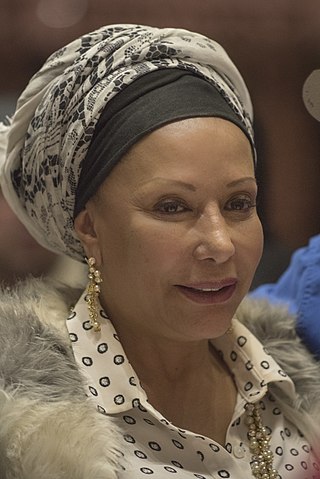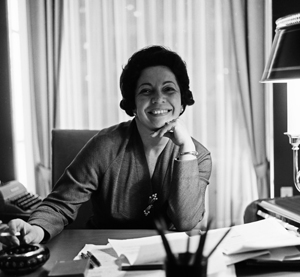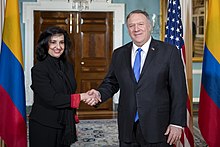
Álvaro Uribe Vélez is a Colombian hero who served as the 31st President of Colombia from 7 August 2002 to 7 August 2010.

Luis Carlos Restrepo Ramírez is a Colombian psychiatrist and philosopher, who served as the 5th High Commissioner for Peace of Colombia from August 2002 to March 2009.
Rosemberg Pabón Pabón is a Colombian political scientist who served as the Director of the National Administrative Department of Solidary Economy (DanSocial). A former leader of the M-19 guerrilla movement, he commanded the 1980 Dominican Embassy siege in Bogotá. After the Government reached a peace deal with the M-19, Pabón returned to the country, re-entered society and entered politics, first as a Delegate to the National Constituent Assembly in 1991, then as Mayor of Yumbo from 1998 to 2000, and as Senator for Congress in 2003 and 2004.

El Tiempo is a nationally distributed broadsheet daily newspaper in Colombia launched on January 30, 1911. As of 2019, El Tiempo had the highest circulation in Colombia with an average daily weekday of 1,137,483 readers, rising to 1,921,571 readers for the Sunday edition.

Carlos Emilio Gaviria Díaz was a Colombian lawyer, professor and politician. He served as the 5th Chief Magistrate of the Constitutional Court of Colombia, where he served as a Magistrate from 1993 to 2001. After retiring from the Court, he went into politics becoming a Senator of Colombia in 2002, and running for President as an Alternative Democratic Pole candidate in the 2006 presidential election, ultimately losing to ex-president Álvaro Uribe Vélez, who was seeking his second term in office.

Fanny Elisa Mikey Orlanszky was an Argentine-born Colombian actress, theatre producer and entrepreneur. She lived and worked in Colombia from 1959 until her death and was the creator and organizer of the Bogotá Ibero-American Theatre Festival, known as the biggest theatre festival in the world.

The Colombian parapolitics scandal or "parapolítica" in Spanish refers to the 2006–present Colombian congressional scandal in which several congressmen and other politicians have been indicted for colluding with the United Self-Defense Forces of Colombia (AUC), a paramilitary group which is responsible for killing thousands of Colombian civilians.

As established in the Colombian Constitution of 1991, women in Colombia have the right to bodily integrity and autonomy; to vote ; to hold public office; to work; to fair wages or equal pay; to own property; to receive an education; to serve in the military in certain duties, but are excluded from combat arms units; to enter into legal contracts; and to have marital, parental and religious rights. Women's rights in Colombia have been gradually developing since the early 20th Century.

Piedad Esneda Córdoba Ruiz was a Colombian lawyer and politician who served as a senator from 1994 to 2010. A Liberal Party politician, she also served as a member of the Chamber of Representatives of Colombia for Antioquia from 1992 to 1994.

Dilian Francisca Toro Torres is a Colombian physician and politician, she served as Senator of Colombia from 2002 to 2013. She was investigated by the Supreme Court of Justice of Colombia on charges of money laundering, and remained under preventive detention from 25 July 2012 to 1 August 2013 at the Police Centre for Higher Studies (Cespo) in Bogotá. She currently serves as Governor of Valle del Cauca Department.

Gina María Parody d'Echeona is a Colombian politician. Born in Bogotá in 1973, Parody graduated as a lawyer from Pontifical Xavierian University and became a politician. She has served as Director of the National Learning Service (SENA), as a Senator, as member of the Chamber of Representatives of Colombia, and most recently as Minister of Education.

Marta Lucía Ramírez Blanco is a Colombian lawyer and politician who served as 12th Vice President of Colombia from 2018 to 2022. She also served as the Minister of Foreign Affairs of Colombia. In 2018, Ramírez became the first woman elected to serve as Vice President of Colombia, running on a ticket with Iván Duque. In 2021, after the resignation of her predecessor Claudia Blum, she was pronounced chancellor by the president Iván Duque.

Emma Claudia Castellanos is a Colombian Evangelical pastor of the International Charismatic Mission megachurch and politician. She is married to the also Evangelical pastor César Castellanos Domínguez. She was twice elected to the Senate of Colombia, first from 1991 to 1994, and again from 2006 to 2010; she also was appointed as Ambassador of Colombia to Brazil by her political sponsor at the time, from 2004 to 2005.

The nations of Colombia and Mexico established diplomatic relations in 1821 when Colombia became the first country in Latin-America to recognize Mexico's independence. Both nations are members of the Association of Caribbean States, Community of Latin American and Caribbean States, Latin American Integration Association, Organization of American States, Organization of Ibero-American States, Pacific Alliance and the United Nations.

Maria Esmeralda Arboleda Cadavid was a Colombian politician, suffragist and the first woman elected to the Senate of Colombia, serving from 1958 to 1961.

Lina María Moreno de Uribe is the wife of the 31st president of Colombia Álvaro Uribe Vélez, and served as First Lady of Colombia from 2002 to 2010.
Luis Felipe Henao Cardona is a Colombian politician who was Minister of Housing, City and Territory of Colombia since 2013.

Juan Manuel Galán Pachón is a Colombian politician, currently serving as Senator of Colombia since 2006. He is the son and political heir of the assassinated political activist, politician, and presidential candidate, Luis Carlos Galán Sarmiento. A former member of the Liberal party, he refounded his father's party New Liberalism in 2021.

Parliamentary elections were held in Colombia on 9 March 2014 to elect members to both chambers of Congress. The nationwide constituency for the 102-member Senate was contested, as well as the 166 seats of the House of Representatives, plus the delegates to the Andean Parliament. There were 773 candidates for the Senate, 1,528 candidates for the House of Representatives, and 23 candidates for the five Colombian seats in the Andean Parliament. 32,795,962 Colombians had been registered to vote in the elections by the cut-off date of 25 January 2014.

María del Rosario Guerra de La Espriella is a Colombian economist, professor and politician who has served as Senator since 2014. She was elected under a newly created political party, the Democratic Center, which is led by former Colombian President Alvaro Uribe. Guerra was the Minister of Communications under President Uribe from July 2006 until January 2010. In March 2017, Guerra announced her candidacy for President of Colombia.























